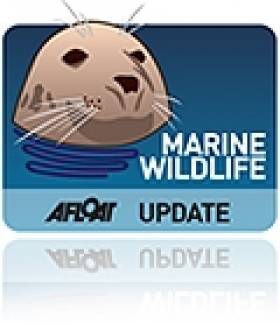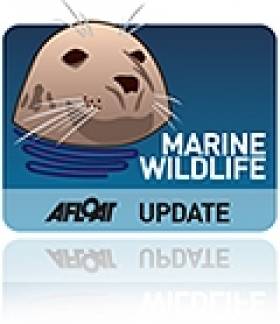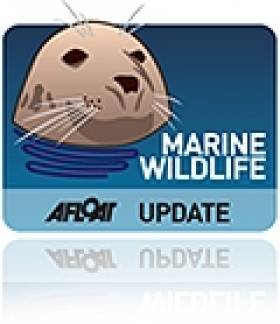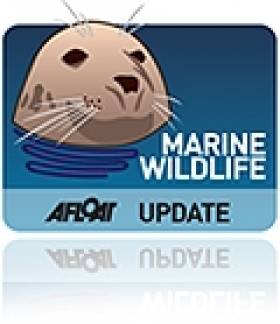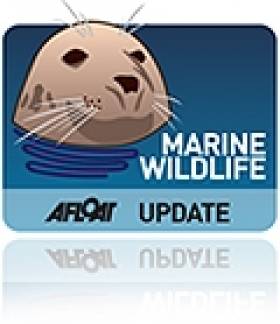Displaying items by tag: Irish Whale and Dolphin Group
Newborn Bottlenose Dolphin Beaches in Co Clare
The Irish Whale and Dolphin Group (IWDG) reports that a newborn bottlenose dolphin calf was washed up in Doolin, Co Clare last week (photos here).
Measuring 1.2m in length and weighing 21kg, the IWDG said it was "by far the smallest bottlenose dolphin recorded stranded in Ireland".
"From the bent dorsal fin and curled tail flukes we can confidently say this dolphin was only just born and live-stranded," said IWDG co-ordinator Simon Berrow, who added that the group could only speculate as to what happened.
"Maybe it was separated from its mother on birth, maybe she was unable to help it to the surface to take its first breath, maybe the mother was alone and did not have the support of a maternal group to assist at birth."
Massive Increase in Whale and Dolphin Strandings
New figures to be released this week on marine animals point to a whopping 25% increase in whale and dolphin strandings in the UK and Ireland.
BBC News reports that data collected by the UK Cetacean Strandings Investigation Programme (CSIP) show reported strandings have risen by a quarter since records began 20 years ago.
The news comes just weeks after the shocking mass stranding of pilot whales in Co Donegal.
It's also reported that at least 500 dolphins, porpoises and whales have been found stranded on British beaches this year.
Commenting on the rising numbers, Ian Enlander of the Irish Whale and Dolphin Group (IWDG) told BBC News: "It may be a sign that awareness of strandings is increasing, or perhaps something else is going on."
The BBC News website has more on the story HERE.
New Pontoon Key to Saving Stranded Whales, Dolphins
A new pontoon intended to refloat marine animals such as beached whales and dolphins along the Atlantic seaboard was demonstrated at the weekend ahead of the Galway Science & Technology Festival.
The Irish Times reports that divers, scientists and local volunteers were among those participating in the training exercise on Gurteen beach, near Roundstone, which involved rescuing and refloating a dummy pilot whale.
Dr Simon Berrow of the Irish Whale and Dolphin Group (IWDG) which ran the exercise said he hoped other coastal communities would follow the example with their own training sessions, given the growing number of strandings along Ireland's west coast.
The new pontoon - which was put on display in the festival exhibition at NUI Galway on Sunday - was purchased with funds raised by the local community and a BBC television team producing the latest series by popular adventurer Monty Halls.
New Course For Marine Tour Operators
The Irish Whale and Dolphin Group (IWDG) is running a new course for marine wildlife tour operators in Galway on 27-28 November.
The two-day course - at the campus of the Galway-Mayo Institue of Technology in Letterfrack - is intended to promote and support responsible marine wildlife tourism, and may provide a basis for a future accreditation scheme for the industry.
The course will be delivered by Dr Simon Berrow and Conor Ryan of the IWDG and is part funded by the Irish Environmental Network under the Department of Environment, Heritage and Local Government's Biodiversity Fund 2010.
Topics covered in the course will include the identification and ecology of marine animals and sea birds, as well as the relevant legislation pertaining to the wildlife tourism industry.
The course fee is €50 per person. Further information is available from Simon Berrow at the Irish Whale and Dolphin Group, Merchants Quay, Kilrush, Co Clare at 086 8545450 or [email protected].
Sonar Possible Culprit in Whale Death Tragedy
Sonar activity by Royal Navy submarines may have caused the deaths of up to 35 pilot whales off the coast of Co Donegal at the weekend, an expert has claimed.
Dr Simon Berrow of the Irish Whale and Dolphin Group (IWDG) said that naval activity in the area is one possible cause of the tragedy.
"Naval exercises use a low frequency active sonar which is known to affect whales very badly," he told the Belfast Telegraph. "Basically it affects their sonar and causes a gas embolism, like the ‘bends’."
The Telegraph reports that tests are still being carried out to determine if the whales that beached on Rutland Island, near the fishing village of Burtonport, are the same as a group monitored in Scotland's outer Hebrides the previous weekend.
The pilot whales had reportedly been swimming off Co Donegal for the past week before they were found dead.
The Belfast Telegraph has more on the story (with photos) HERE.
Minke Whales in Big Numbers Off Southwest Coast
The Irish Whale and Dolphin Group (IWDG) has recorded two surprisingly large aggregations of minke whales off the southwest coast.
The group reports that regular observer Nick Massett counted a group of eight minke whales off Slea Head in Co Kerry, which is a high count for the area.
But fellow observer Parick Lyne trumped that number with his sighting of at least 16 minke whales at the entrance to Bantry Bay between Bere Island and Sheep Head.
The IWDG said it "can't recall such large numbers of mikle whales in a relatively small area".
The group speculates that an abundance of "whale food" in southwest coastal waters is attracting their attention.
Killer Whale Stranded on Mayo Beach
The Irish Whale and Dolphin Group (IWDG) reports that a killer whale was found stranded in Tullaghan Bay, Co Mayo earlier this month.
A post morten was carried out on the carcass of the female killer whale by Conor Ryan and Alessandro Pierini of the Galway-Mayo Institute of Technology. The good condition of the carcass also allowed the team an opportunity to examine its stomach contents, which did not include any foreign objects.
The killer whale, which was stranded on the beach at Doohoma, was found to be pregnant with a large near-term female calf which was oritented backwards in the birth sac, though there is no obvious connection to the cause of death.
According to the IWDG, it is only the 15th stranding of a killer whale in Ireland since records began, and the seventh in the last 40 years. A pectoral fin was removed for display at the Natural History Museum.
Dead Dolphin in Youghal Prompts Vigilance
Following the discovery of a dead dolphin in Youghal last week, the Irish Whale and Dolphin Group (IWDG) has called on locals to be watchful for marine mammals in distress.
The common dolphin was found washed up on Clay Castle beach last Wednesday 29 September. The species is a frequent visitor to Youghal, and has even been seen upstream in the river Blackwater.
If anyone in the Youghal area comes across a dead or live stranded dolphin, they are urged to contact their area IWDG members Paradig Wholley (Tel: 023 8838761) or Janet Howley (Tel: 086 3977160) or visit www.iwdg.ie.
Monty Halls Gives Talk on 'Capturing Giants'
Renowned diver Monty Halls is set to present a public talk on his marine animal work filming whales, sharks and dolphins around the world tomorrow night (7 October).
Halls, who has been in Ireland since April making his latest documentary series for the BBC, has been assisting the Irish Whale and Dolphin group (IWDG) with its research on whales, dolphins and basking sharks in Irish waters.
The diver, filmmaker and former Royal Marine, who is also a popular motivational speaker and performance coach, will talk on his experiences filming and diving with marine mammals around the world, and will surely provide some great entertainment.
The talk, part of the Tales of the Whales Lecture Series organised by the IWDG and the Galway-Mayo Institute of Technology (GMIT), begins at 8pm on Thursday 7 October in Lecture Room 1000 at GMIT, Dublin Road, Galway. The event is free and all are welcome to attend.



























